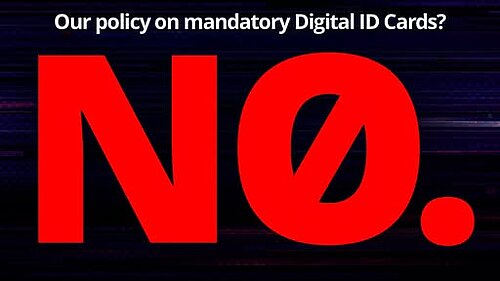Ian Sollom: Why I Oppose Digital Identity Cards

As the parliamentary recess for the party conference season draws to a close, much of the focus has been on the well-documented troubles facing Keir Starmer—falling approval ratings, turbulence in his team, opponents both internal and external breathing down his neck. Clearly feeling the need to grab some initiative and look tough on immigration, the Prime Minister sadly reached for a modern twist on a long-discarded policy: Digital ID cards.
You can see why Starmer thought it might be a good idea: headline polling earlier in the summer had suggested the majority of the public support national identity cards (though more detailed analysis revealed more than a little scepticism). Since the announcement, however, a YouGov poll has put 42% in support of the proposal with 45% opposing, and a parliamentary petition against digital ID has attracted over 2.2 million signatures and counting at the time of writing.
That shift in public opinion tells us something important. The idea might sound reasonable—sensible even—in principle, but it becomes much more problematic when you start thinking through what it actually means in practice.
The international comparison many supporters turn to illustrates the point. Estonia is often held up as the shining example of digital government, and fairly so—their system works brilliantly. Citizens can vote online, access all government services seamlessly, and it is claimed that digital signing saves them five working days a year.
But as is usually the case in politics, context matters, and Estonia’s is very different to the UK. After regaining independence in 1991, Estonians essentially rebuilt their entire modern state from scratch. They wrote a new constitution with strong rights protections and robust judicial oversight. When Estonian politicians promise digital systems will only be used for legitimate purposes, there are solid constitutional barriers and institutions stopping future governments from breaking those promises.
Britain does not have these safeguards. The parliamentary sovereignty which we all became so familiar with during the Brexit process means any government with a working majority can change any law at any time. Today's protections can very easily become tomorrow's inconveniences to those in power.
Once you build infrastructure for comprehensive state surveillance, it gets used. During the Second World War identity cards started with three specific purposes but ended up used by thirty-nine government agencies – a big driver for the rejection of “Papers Please” society we had become by 1951. The mission always creeps, especially when constitutional courts can't say "no."
Perhaps some, even many, would be prepared to take this risk with our freedoms to address the challenges of immigration – it is after all high on most polls of what the public care about. And yet using immigration control as justification for Digital ID doesn’t stand up to scrutiny. Employers already face fines of up to £20,000 per illegal worker—substantial deterrents exist. The problem isn't that checking documents is too difficult; it's that some employers deliberately break the law because they calculate they won't get caught. If the problem is with a lack of investment in enforcement, putting vast amounts of money into a more sophisticated verification system isn’t a solution.
All of which is before we get to how badly the government manages its existing digital systems. To take one pertinent example, the eVisa scheme, covering millions of people already, has been plagued with problems, with the government's own figures showing hundreds of complaints every month from people unable to access their immigration status when they need it. The Home Office has acknowledged there are “significant glitches” and that some people “may have difficulty proving their status” – it hardly inspires confidence in a government creating a universal digital ID.
And then there are the challenges of inclusion. Despite promises of alternatives for people without smartphones, digital systems inevitably push aside those who struggle to use technology—older people, those on low incomes, people with disabilities. I know from my surgeries that some people already struggle to access services without extraordinary effort. Formalising these barriers is deeply troubling.
Twenty years ago, Liberal Democrats successfully fought off Tony Blair's ID card scheme. It’s frustrating that we’re here again, but Digital ID cards represent the same fundamental threat to our freedoms, dressed up in modern technology and justified by different fears. Parliament needs to say no to Digital ID.
You can sign our petition here https://www.libdems.org.uk/nodigitalid
